- Home
- Adele Griffin
Tell Me No Lies Page 16
Tell Me No Lies Read online
Page 16
“So clap really hard,” Matt had said on the phone last night.
“It’s the kind of assembly I want to give,” I said. “One where you can tell people are actually connecting with me.” Then I wished I hadn’t said it, because I could feel Gage and Mimi thinking: Then do yours on your epilepsy.
I’d never spoken about my own condition with the others. Not my absences, or my meds, or Dr. Neumann—nothing. If Gage and Mimi ever talked about it, and I always hoped they didn’t, it was all behind my back.
Gage had straightened in her seat and was looking past us. I twisted around.
Claire was approaching.
“Here.” Her hand was outstretched and her face was neutral as she delivered the envelope. It was the same generic business envelope that I’d stuck in her locker, and for a scalding second I thought she was returning my own letter to me.
But no. This envelope was unmarked. I’d scripted her name onto the one for the note I’d written.
I took it—it wasn’t even sealed, so I had a clear view of three twenties, newly minted.
“Thanks.” I’d have felt worse if the money had been soft and crumpled, but these bills looked as if Claire had popped by an ATM and withdrawn them from the cash piles in the Sleighmaker vault.
“Okay,” said Claire. “We’re square.”
A tiny hammer was pinging minute flashes of pain over my eye. “Thanks a lot, Claire,” I said again.
She turned and left.
“What was that about?” asked Mimi.
“Nothing. She owed me some money.”
“I know you’re friendly with Claire, but she’s so random. How does she get away with wearing a black turtleneck for a uniform? And she skipped morning classes today.” Mimi shook her head. “Her grades must be in the toilet.”
“Her whole day is basically a silent anarchy of flipping off the school,” said Gage.
I lifted my shoulders like dunno, though I certainly wasn’t thinking about any of what Mimi and Gage were talking about. Claire was so angry with me. I never should have told Mom that Claire owed me money. I never should have chased it down. For sixty dollars, I’d lost Claire’s trust, the only thing that mattered to me.
“Do you even know where she’s applied to colleges?” Mimi asked me.
“California,” I answered. “She told me once, she wants to head west.”
“Imagine, my letter is just sitting there,” said Gage. “I’m sure my mom’s holding a flashlight underneath, trying to read it.”
“You’re both getting in,” said Mimi. “It’s not even an exciting discussion.”
“Don’t jinx us,” I told her.
Colleges had mailed out all early-decision acceptance letters last Friday, which meant they’d probably arrived today. It had been on my mind all weekend, and especially this afternoon. Still, I was glad I didn’t have to pull a shift at Ludington, and that Matt had wrestling tryouts so he couldn’t pick me up. I’d already planned to ride home on the school bus. Long and pokey as my route was, I’d still beat Mom home and snag it.
My parents weren’t like Gage’s parents, swooping into my mail with flashlights. But I still wanted to hear from Princeton in solitude.
As usual, the mail lay on the living room carpet, where it had fallen through the slot. When I went through it for the first time, I missed it completely because I’d been looking for something thicker—an envelope plumped with inserts from the bursar, dining services, and student housing. That’s what acceptance letters looked like, I remembered from when Theo got his.
So I hadn’t anticipated its wafer thinness beneath Mom’s oversized Spiegel catalog.
Thin meant bad.
Still, my mind was careening around my reason, hounding down a way to make thin mean normal. I ripped the envelope from the top.
It was weightless because it was a formality? Just a quick, official nod from Admissions?
I’d get the thick envelope next week. Yes, that was it.
I sat on the floor. Words jumped around, passing through me in tiny zaps, competing for priority.
. . . have carefully considered . . .
at this time deferred . . . to be reconsidered . . . regular pool.
I hadn’t gotten into Princeton. Not in. I’d have to wait and see in April, with all the other applicants. Panic was confetti in my head. I’d have to tell my parents, I’d have to tell everyone, I needed to start right-this-second applying to more colleges. My stomach was acid. Silver flashes pinged my eye again; literally, I couldn’t see straight. But today, a seizure wasn’t my main concern.
Upstairs I kicked off my boots and fell into the sloshy snoozing comfort of my parents’ waterbed. I pulled up the covers and let the rejection sink into my bones.
And then I called Gage.
All year, every year, since the beginning of middle school when homework and grades and prizes began to mean something, Gage and I were neck and neck. We were the only two students who consistently landed on the highest honor rolls. We both knew what cram sessions felt like, we knew the 3:00 a.m. thrill of solving a physics problem, the endless memorization of time lines and the try, try again. I couldn’t think of anyone better to help me through my defeat.
“Hey-ey!” The lilt in her voice meant yes. Gage Renee Hornblow had been formally accepted into Harvard’s Class of 1993. “Did it come?”
“Deferred till April.”
“Oh, no, Lizzy.” Racing out of her joy to enter my gloom, her voice was so exactly what I needed that tears smarted in the corners of my eyes. “But it’s not like you got rejected. Rejected is a whole other can of worms. Your real chance is April. Don’t cry, Lizzy. Come on. Do you have everything lined up and ready to go out?”
“There are some other applications on my desk.” I wiped my eyes with the back of my hand. “I haven’t even started.”
Gage sucked in a breath through her teeth. Gage was different from me—she’d been so paranoid that she wouldn’t get into Harvard that she’d completed a storehouse of applications earlier this fall, to be safe.
Me, I’d let my optimism wing it, all the way to a crash landing.
“It’ll be okay,” she said. “It’s a setback. I’ll help you get cracking if you want.”
“Thanks. And there goes my winter break,” I added, in semi-afterthought. “As my parents freak out.”
“Right.” Gage hadn’t thought of that, or that now my parents would never let me go skiing at Mad River. They weren’t crazy about the idea of my doing anything so wild as downhill skiing with my condition. January 1 deadlines would be the perfect excuse.
“I’m really glad for you, Gage. You worked hard.”
“You did, too, Lizzy—and it’s not over yet.”
But I’d be deep in the shame of it tomorrow. That I knew. The jolt of my getting deferred by Princeton would be more like salty gossip than a juicy rumor, but it had enough flavor to pass along. My name would be spoken in whole new Did you hear? whispers for the rest of the week.
But now it was just me and Gage, her good news and my bad news, and all of it cradled in a friendship as old as memory.
I stayed on with her for a while.
My parents would be upset, my classmates would be shocked, I was wrenched with what-next nerves, but losing Mad River made me saddest. I’d really wanted to spend that week with Gage, to restrengthen a friendship that had felt a little bumpy these past couple of months—it would have been exactly what I needed. Instead I was out on a tightrope, with nothing but a lonely uncertainty stretched out in front of me, and no voice in my head convincing me that everything would be okay.
thirty-three
Princeton hadn’t accepted me, Claire wasn’t talking to me, and by the end of the week when my first semester marks came in, I was in trouble with Argyll, too. My grades had dropped in everything but AP A
rt, where I’d landed an improbable 96. Even with that boost, my 90 in Ancient Civ, 84 in Classical Studies, 86 in Latin, and 91 in English had struck me down with an average that, for the first time ever, fell below a 90.
“I’m guessing that these low marks feel like punishment enough, Lizzy, but for Mom and me, it’s the last straw. You’re grounded starting next week, for winter break,” Dad remarked during dinner cleanup that night. “It’s hard for us to understand why you’re not taking your life seriously anymore. Did you even figure out a topic for your senior assembly?”
“Uh, yeah.” The Mary Cassatt kitchen wall calendar was above the stove. “I’m doing it on Mary Cassatt.”
Dad blinked. “Well, that’s nice. Your mom’s favorite artist.”
“I thought that would make her happy.”
And when Mom heard, she was. Maybe it was Mary Cassatt that paved the way for my parents to let me keep one final date with Matt that next week, to say good-bye before his two weeks away to Club Med in Cabo, Mexico. I knew a lot of families that did these mysterious Club Meds in a world parallel to the one where my own family lived. Matt had done a ton of them, and he wasn’t even excited about this one.
He picked me up after dark and told me it would be a surprise, and to dress warmly. I hadn’t realized how much I didn’t want to see Claire and Dave until Matt’s car pulled up and I saw he was alone. I’d tried to downplay how wrecked I felt about Claire’s and my feud because it seemed insecure, and Matt was so sure it was just a temporary misunderstanding.
“Where are we headed?”
“You’ll see.”
We exited at Valley Forge, and when we turned into the park, I still couldn’t figure it out. It was after five, with none of the usual RVs and tour buses in the parking lot.
“Are we going to reenact key battles of the Revolutionary War?” I asked as we parked and got out. “That could be so romantic.”
“Valley Forge National Park is romantic, goofball,” said Matt. “And the rules here are loose. Like, if you get here before dark, you can have a picnic.”
“All I’ve got in my bag is gum.”
Matt popped the trunk and took out a picnic basket. “Luckily, I’ve got apples and cheese and crackers, and even a Bartles and Jaymes.”
“Whoa, that is romantic.”
“Gotta have faith. I’m not always a dumb jock.”
“Well, except that this picnic isn’t historically accurate—George Washington’s soldiers mostly drank gruel flavored with pepper and old socks.”
He shut the trunk and slung an arm around me. “This wine cooler might not taste much better. I rooked it from the Powerses’ wine fridge—they go through it so fast, they’ll never notice.”
Matt had even brought a blanket, and he knew where to spread it out, on a hill clearing with a view of the fields that he said was off the beaten trail of the park rangers, who didn’t start patrolling until after nine.
“Are you too cold?” he asked.
“No, it’s nice.” I bit into a crisp apple and suppressed a shiver.
Matt pulled me in from behind, so that his legs were on either side of mine. His hands kneaded my shoulders. “I feel bad you aren’t doing anything cool for break,” he mentioned.
“Oh, is this a guilt shoulder rub?” I laughed.
“Everything’s a guilt thing when you’re Catholic.”
“I’ll take it. It feels too good.” I gave over a couple of minutes to the pure enjoyment of Matt’s muscle power. “Do you think you’ll quit going to Mass, when you’re in college?”
His fingers paused a moment. “I might,” he admitted. “If God is really the way my parents think, I think I should probably stop hanging out with him on Sunday.”
The backrub felt so good, and so did the closeness of Matt’s body, and the darkness, and the fact that we were completely alone—nobody for miles—and after a few minutes, I pushed back against Matt’s chest so that he knew to lie down, and then I flipped over to face him. We kissed, and finally the cold started to feel good, mingled with our heated breath.
“We might get caught,” I whispered. “Imagine if some of those park rangers were out here, watching.” That idea of getting caught had cranked Matt up before, and sure enough, I could feel him get hard, and this time—thanks to my discussion with Mimi, who as it turned out had all kinds of pointers in the art of this job, I understood exactly what to do. Gentle, no friction, keep the rhythm steady but mix up the pressure . . . When he came, fishing a paper napkin from the picnic basket to clean himself up while I discreetly looked away, he seemed so surprised that I didn’t know what to say, and we didn’t speak about it at all on the drive back.
“See you soon,” he said, giving me a small kiss and still looking a little shocked by the whole thing when he dropped me off at home.
“Don’t do anything I wouldn’t do,” I answered, and for the first time, I realized I could say that without being totally ironic. I’d done some things. I’d done something tonight. It made me feel half triumphant and half ashamed, and I wondered if that’s how Matt felt, too.
A little later, alone in the kitchen with a cup of tea and nothing around to read but my brothers’ discarded skateboarding magazines, I could feel the chains of this dreaded vacation settle in around my ankles. Matt was gone. The Hornblows were heading to Mad River, in Vermont. Mimi was around, but every other year the Kims hosted their extended family from Korea, and this was that year, and Mimi was expected to pitch in.
Matt had warned me it would be too hard for him to call long-distance from Mexico, so I didn’t really expect him to. But over the next days, whenever I heard the phone, I hoped.
Meantime, I was stuck with a whole lot of Peter and Owen, who seemed to be extra underfoot, turning every room into a burrow of crusting cereal bowls and discarded sneakers and sweatshirts. On one of my rare outings, I tagged along with the family for some Christmas shopping, which didn’t put me in a holly-jolly mood, either. It wasn’t like I could splurge for anything, with the debt I was in. I bought some festive tins at Pottery Barn, and one day when the family was out, I baked cookies, with oatmeal or raisins or chocolate chips or nuts, depending on preference. It was a cop-out, gift-wise, but I was so broke, what else could I do?
Our parents used major holidays to give the necessities, like winter boots and jackets, but on this Christmas morning, my fireplace stocking held a card with a check for $150 along with a stern message from Santa informing me that this money should be used to pay off my Mastercard.
I appreciated the check, but the note felt like a lump of coal.
To help time pass, I set tasks for myself. One afternoon, I purged my oldest clothes for the Salvation Army. Into a white kitchen garbage bag went my ankle-length, celery-green pleated paisley skirt, my butterscotch-brown Little House on the Prairie boots, my deep-V cropped checkered blazer, my eggplant turtleneck, and a pair of pleated dress pants that Peter had outgrown and given to me that had never fit me right. My modern dance clothes were just as ugly: thick pink sweatpants, shiny blue tights and silver leotards, an unending supply of shapeless T-shirts.
When I was done, the bag bulged, and my closet and dresser looked so empty I could have been a hotel guest in my own bedroom. But it also felt good. My future didn’t wear these bright patterns and flowery prints. I was graduating from that girl. Wherever I landed come fall, it was the one thing I knew for sure.
A few afternoons, I also braved phoning Claire’s house. Her mom answered every call, and once I was put on hold for long, humiliating minutes. When Mrs. Reynolds came back on the line, she told me in a stilted voice that while she’d thought Claire was in the house, she’d been terribly mistaken.
“Please be sure to let her know I was trying to get ahold of her? I know she’s going to visit her dad for most of the holidays.”
“Yes, of course. She’ll want to be in to
uch with you, too, Lizzy.”
We hung up, both of us embarrassed by her lie.
Claire left without calling me, Matt never phoned, and vacation dragged on. My bedroom was a study zone, my desk cluttered with Bic pens and index cards, legal paper and loose notes, soda cans and coffee cups. Gran had catapulted me into the new technology by giving me a Christmas-present boom box with a CD player, along with one lone CD, George Winston’s December. The instrumental carols reminded me of walking alone down a country path at twilight, and the music kept me focused as I edited my essays and inched through earnest, personal explanations of why I’d be perfect for each college—though I couldn’t see myself at any of them.
Stir-crazy on New Year’s Eve, I jumped a train into the city. It was the first time I’d ever gone into Philadelphia alone, but my trips with Claire had bucked up my confidence. I planned to see one of those weird foreign films they showed at the Ritz Five, but I told my parents the trip was for AP Art, because I needed to draw my hand in different locations. I even carted along my notebook and drawing supplies.
My lie ended up shaping the afternoon, because once I got there, I decided to skip the movie and walk over to Moore College of Art to look at a student sculpture exhibition in the lobby. I then hit some galleries in Old City, where I sketched people and copied artwork and drew my hand.
At the Philadelphia Museum of Art, I saw the painting at once, as clear as if it had shouted my name from across the room. The billboard scale, the bold lines and bright colors, the fierce drumbeat motion in the composition. Of course, it had to be him, and I had to know more. I jotted down all his information in my notebook. Finally something had sparked.
So long, Mary Cassatt.
Walking alone through the city, my colored pencils clinking lightly in the sling bag over my shoulder, I felt more like myself than I had both these past two weeks of being stuck in my room. I stopped for a cheese sandwich at a café, and it tasted like the most delicious cheese sandwich ever made. With a little bit of time to duck into a final gallery, I discovered one on the same block—a light-filled space of tall rooms and a wooden floor that creaked like a boat. The gallery was so quaint that when I first spied her, I didn’t recognize her, although when I did, I wished I hadn’t.

 All Pets Allowed
All Pets Allowed Witch Twins Series
Witch Twins Series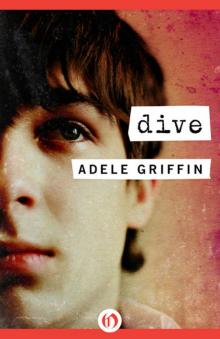 Dive
Dive V is for...Vampire
V is for...Vampire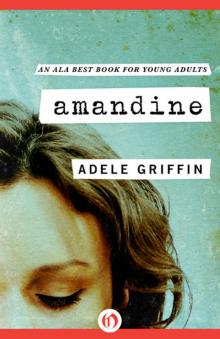 Amandine
Amandine The Knaveheart's Curse
The Knaveheart's Curse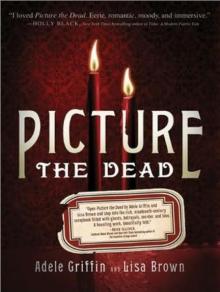 Picture the Dead
Picture the Dead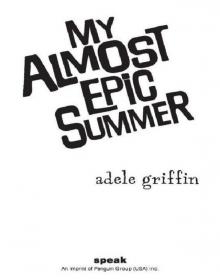 My Almost Epic Summer
My Almost Epic Summer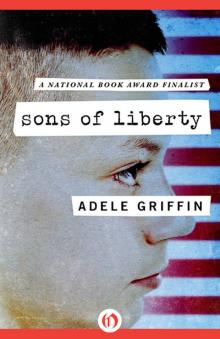 Sons of Liberty
Sons of Liberty Overnight
Overnight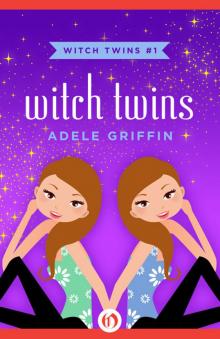 Witch Twins
Witch Twins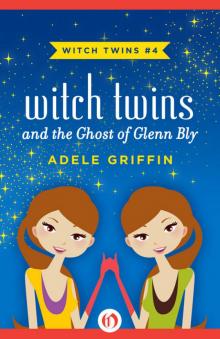 Witch Twins and the Ghost of Glenn Bly
Witch Twins and the Ghost of Glenn Bly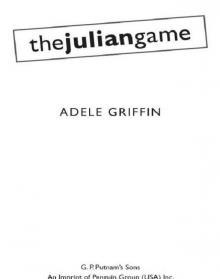 The Julian Game
The Julian Game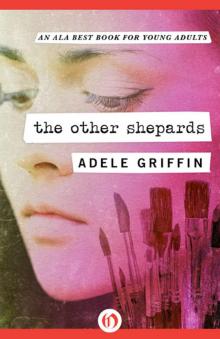 Other Shepards
Other Shepards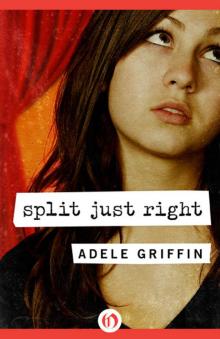 Split Just Right
Split Just Right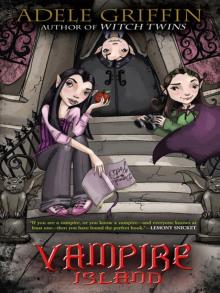 Vampire Island
Vampire Island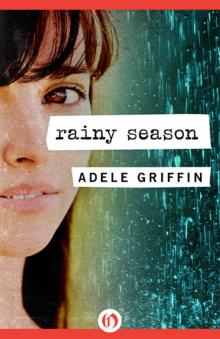 Rainy Season
Rainy Season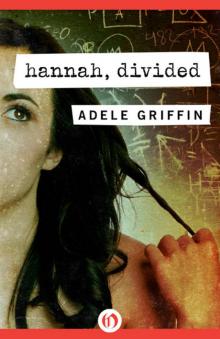 Hannah, Divided
Hannah, Divided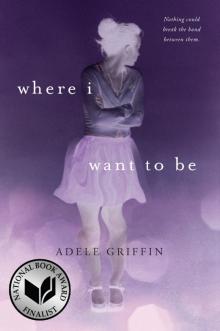 Where I Want to Be
Where I Want to Be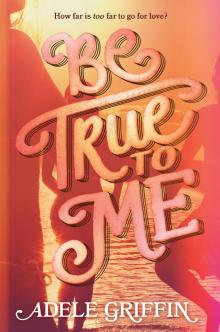 Be True to Me
Be True to Me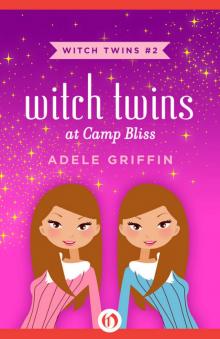 Witch Twins at Camp Bliss
Witch Twins at Camp Bliss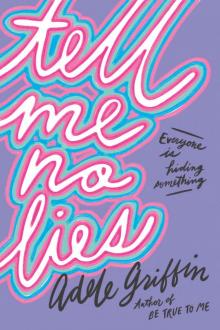 Tell Me No Lies
Tell Me No Lies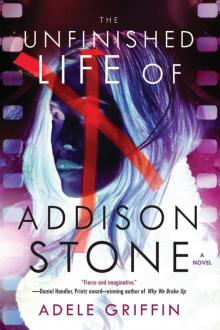 The Unfinished Life of Addison Stone
The Unfinished Life of Addison Stone